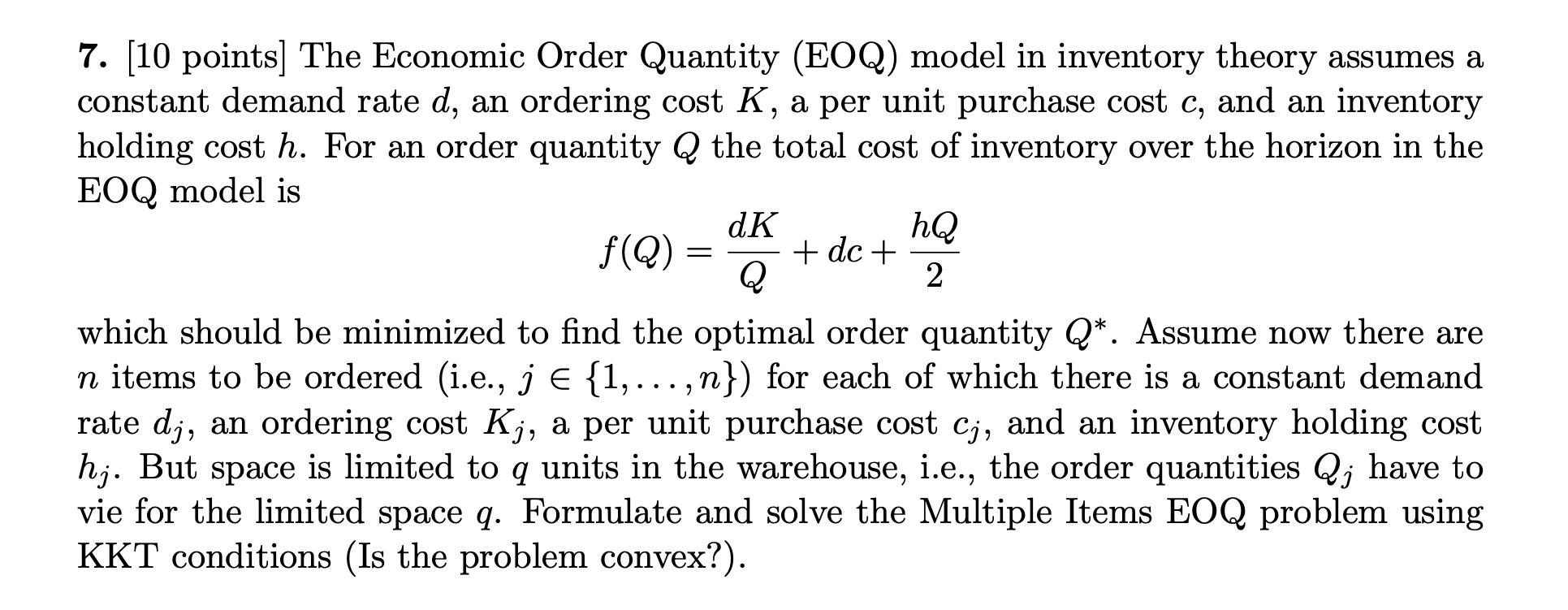Question
7. [10 points] The Economic Order Quantity (EOQ) model in inventory theory assumes a constant demand rate d, an ordering cost K, a per

7. [10 points] The Economic Order Quantity (EOQ) model in inventory theory assumes a constant demand rate d, an ordering cost K, a per unit purchase cost c, and an inventory holding cost h. For an order quantity Q the total cost of inventory over the horizon in the EOQ model is dk (Q) = + dc + Q hQ 2 which should be minimized to find the optimal order quantity Q*. Assume now there are n items to be ordered (i.e., j = {1,...,n}) for each of which there is a constant demand rate dj, an ordering cost K;, a per unit purchase cost cj, and an inventory holding cost hj. But space is limited to q units in the warehouse, i.e., the order quantities Q; have to vie for the limited space q. Formulate and solve the Multiple Items EOQ problem using KKT conditions (Is the problem convex?).
Step by Step Solution
There are 3 Steps involved in it
Step: 1

Get Instant Access to Expert-Tailored Solutions
See step-by-step solutions with expert insights and AI powered tools for academic success
Step: 2

Step: 3

Ace Your Homework with AI
Get the answers you need in no time with our AI-driven, step-by-step assistance
Get StartedRecommended Textbook for
Essentials Of Business Analytics
Authors: Jeffrey Camm, James Cochran, Michael Fry, Jeffrey Ohlmann, David Anderson, Dennis Sweeney, Thomas Williams
1st Edition
128518727X, 978-1337360135, 978-1285187273
Students also viewed these Finance questions
Question
Answered: 1 week ago
Question
Answered: 1 week ago
Question
Answered: 1 week ago
Question
Answered: 1 week ago
Question
Answered: 1 week ago
Question
Answered: 1 week ago
Question
Answered: 1 week ago
Question
Answered: 1 week ago
Question
Answered: 1 week ago
Question
Answered: 1 week ago
Question
Answered: 1 week ago
Question
Answered: 1 week ago
Question
Answered: 1 week ago
Question
Answered: 1 week ago
Question
Answered: 1 week ago
Question
Answered: 1 week ago
Question
Answered: 1 week ago
Question
Answered: 1 week ago
Question
Answered: 1 week ago
Question
Answered: 1 week ago
Question
Answered: 1 week ago
Question
Answered: 1 week ago
View Answer in SolutionInn App



